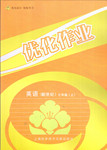题目内容
Have you ever flown on an airplane? Before you left,you 41 everything you would need for your 42 in a suitcase. Most suitcases that travel on an airplane have to be 43 in special areas away from the passengers. It helps keep the plane 44 . This also frees up more room for passengers and makes them more 45 .
While you were flying in the airplane^ you might have had 46 looking out of the window or listening to music. Your suitcases,though,didn't get the same 47 . Where had they gotie? Most airports have (行李处理系统) that 48 your baggage during your trip.
The systems differ from airport to airport,but baggage handlers have three 49 jobs. First,they move your baggage from the check-in area to the 50 you’ 11 be catching. Then your baggage 51 sit with all the other passengers’ baggage in certain areas of your airplane. Second,if you have to 52 airplanes somewhere during your trip,your baggage will be moved to the new airplane you are going to 53 . Finally,they will move your baggage from the airplane to a 54 area at your final destination (目的地) .
Of course,the systems must make sure baggage travel to the 55 airplanes. Even so,mistakes happen every day. Sometimes,baggage may 56 their airplane. When this happens,they may be found 57 and sent on the next available airplane. Some baggage,though,gets 58 for longer periods of time and may end up in offsite storage facilotise(异地仓储设成点) .Baggage that can never be 59 to their owners may be given away to charity 60 they can be sold at special auctions( 拍卖会) .
41. A. forgot B. packed
C. rewrote D. discovered
42. A. trip B. visit C. house D. village
43. A. cleaned B. shared C. stored D. repaired
44. A. safe B. fixed
C. heavy D. organized
45. A. careful B. beautiful
C. confident D. comfortable
46. A. fun B. money C. courage D. patience
47. A. education B. treatment
C. knowledge D. experiment
48. A. make use of B. take care of
C. catch up with D. break away from
49. A. easy B. interesting
C. Tnain D. well-paid
50. A. bus B. boat C. train D. airplane
51. A. usually B. nearly C. never D. still
52. A. stop B. control
C. change D. choose ,
53. A. see B. take C. save D. order
54. A. picnic B. dining
C. rest D. collection
55. A. right B. quiet C. small D. slow
56. A. meet B. follow C. miss D. destroy
57. A. clearly B. quickly
C. strangely D. suddenly
58. A. lost B. washed
C. broken D. prepared
59. A. added B. lent
C. introduced D. returned
60. A. if B. so C. or D. but
本文是说明文。文章主要介绍了人们乘坐飞机时其行李箱的运送方式。
41. B. 42. A. 由文章首句可知,这里是 说坐飞机的经历。你在出发前会将 “旅行(trip) ”需要的东.西都“打包 (packed) ”。
43. C. 由下文的 your baggage …in certain areas of your airplane 多数行李箱都会随机“存放(stored) ” 在远离乘客的固定区域。
44.D. 将行李箱存放在固定区域内会使 机舱内变得“整齐有序(organized) ”。
45. D. 由该空前的 This also frees up more room for passengers 可知”同时 会让乘客更加“舒适(comfortable) ”。
46. A. 由该空后的 looking out 9f the window or listening to music 可知,你 可能会望望窗外或是听听音乐,享受 旅行的快乐,故填ftin。
47. B. 由上文的 Most suitcases …in special areas away from the passengers 可知,你的行李箱并不会享受同样的 “待遇(treatment) ”。
48. B. 由该空前的 baggage handling systems可知,机场的行李处理系统 会专门负责安置你的行李,故填take care of 49. C. 由该段中的First,Seeond和 Finally等相关信息可知,机场的行李 处理系统有三项“主要(main) ”工作。
50. ET。由上下文内容可知,这里是说乘 坐“飞机(airplane ) ”。
51. A. 你的行李箱“通常(usuaUy) ”会和其他乘客的行李箱一同放置在机舱内的固定区域。
52. C. 53. B. 由该句中的your baggage . will be moved to the new airplane知,这里是说:如果你在途要“转机 (change airplanes) ”的话,你的行李箱 也会被转移至你即将“乘坐(take) ”的 飞机。
54. D.由该空后的 final destination 可 知,你的行李箱最终会被转移至目的 地的行李“收集(collection) ”站。
55. A.由该空后的 Even so,mistakes happen every day可知,这里是说:这 些系统必须确保行李箱上“对 (right) ”飞机。
56.C。由该空后的 When this happens,tlky ... the next available airplane 可 知,行李箱有时也会“错过(miss) ”它 们的飞机。
57. B.它们可能“很快(quickly) ”会被找 到,然后搭乘下一班飞机。
58. A.由该空后的 end up in off-site storage facilities可知,有些行李箱“遗 失(lost) ”的时间会更久。
59. D.由该空后的 may be given away to charity可知,那些永远都无法“归 还(returned) ”给失主的行李箱可能 会被捐赠给慈善机构。
60. C.由 charity 和 auctions 可知,此处 是一种选择关系,故填or。

 培优三好生系列答案
培优三好生系列答案 优化作业上海科技文献出版社系列答案
优化作业上海科技文献出版社系列答案